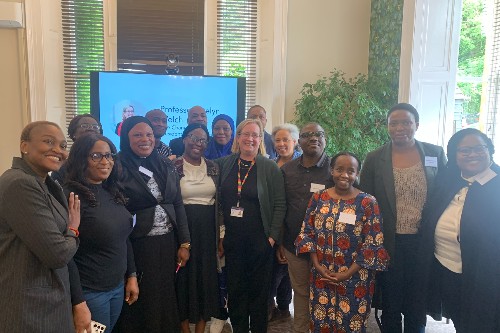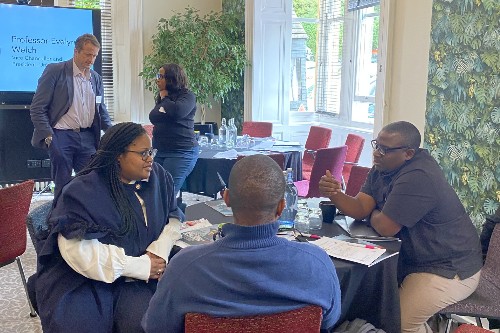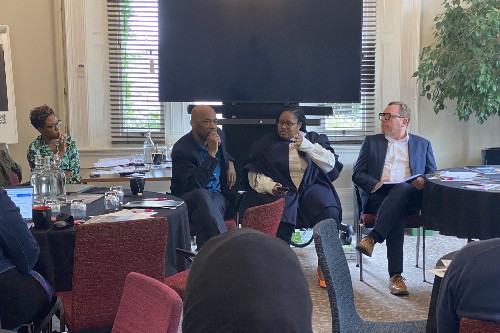
Professor Evelyn Welch, Vice-Chancellor and President at the University of Bristol (centre) with academics in attendance.Breaking the Barriers to Black Academia

Event hosts Dr Natalie Cozier (front left) and Professor Steve Eichhorn (rear left) with academics in attendance.
Breaking the Barriers to Black Academia

Facilitator Saskia Walcott, Professor Winston Morgan, University of East London, Dr Natalie Cozier and Professor Phil Taylor, Pro Vice-Chancellor for Research and Enterprise, University of Bristol (left to right).
Breaking the Barriers to Black Academia
Academics from across the country including senior sector leaders enjoyed a productive day aimed at advancing opportunities and progression of researchers from underrepresented groups.
The meeting focused on promoting High Quality Research, as part of the Breaking Barriers to Black Academia programme which supports the training and development of scientists of Black heritage.
Professors Evelyn Welch, Vice-Chancellor and President, and Phil Taylor, Pro Vice-Chancellor for Research and Enterprise at the University of Bristol, and Winston Gordon, Professor of Toxicology, Equity, and Inclusive Practice at the University of East London were among the keynote speakers, sharing insights on Racial Equity, Diversity, and Inclusion (EDI) issues, career progression, and work-life balance.
Dr Naercio Magaia, Lecturer in the Department of Informatics at the University of Sussex, said: "I really enjoyed the presentations and discussions, which were very informative and a good opportunity to reflect on progress made in relation to Equality, Diversity and Inclusion, as well as future challenges and opportunities to support the Black community."
The day, held last month at Engineers' House in Bristol, featured structured writing sessions with personalised feedback and group discussions.
"The writing sessions provided practical input and I used this to rework an application for a future leaders scholarship. It was also great to interact with researchers from other institutions and disciplines," Dr Magaia added.
"The chance to network with senior academics highlighted the importance of having an advocate, who can be a critical friend and help you reach wider career goals. I've been added to the Social Networks so look forward to staying in touch and keeping up the momentum."
The sessions are jointly funded by the University of Bristol and UKRI's Engineering and a Physical Sciences Research Council (EPSRC) EDI fellowship, geared at overcoming ongoing racial injustices in national funding award practices and improving equal opportunities.
Dr Edward Apeh, Principal Academic in Computing at Bournemouth University, said: "It was a great and insightful experience. Having input from the Vice-Chancellor and Pro Vice-Chancellor was a real advantage, and I appreciated their thoughts on work-life balance, what to prioritise, and how to progress.
"I've attended previous sessions online, but this was the first in-person one, so I benefited from the extra discussions and connections this generated. It was a good opportunity to meet academics at different levels and learn how they are building their networks and advancing their careers. More widely, the programme has further heightened my desire to support my Black colleagues in their quest to make high quality contributions to society and gain recognition for their work."
The programme involves 115 early, mid, and advanced-career scholars from Science, Technology, Engineering, and Mathematics (STEM) disciplines, predominantly from the Southwest region.
Dr Andongma Awawing Anjwengwo, Senior Research Associate at Lancaster Environment Centre at Lancaster University, had a long journey to make the event but found it more than worthwhile.
Dr Andongma said: "I really enjoyed everything about it. It felt like being home, connecting with people who understand your story and struggle. Knowing others who are on the same journey is so comforting and motivating.
"Sometimes it can feel isolating in your research lab, so to have this ongoing support system and friendship is really valuable. Besides network, the advice on grant proposal development was also helpful. Having the insights and guidance from very experienced senior leaders gave me some great pointers. In particular, I learned about the importance of resilience and understanding the system so you can strategically position yourself for success.
"Despite my train being cancelled on the way home, I would definitely do it all again and look forward to building and further strengthening this nurturing culture with colleagues here."
The next part of the programme involves bespoke mentoring and support for proposals, which will run over the next year.
Event moderator Dr Natalie Cozier, Research Project Manager at the University of Bristol School of Civil, Aerospace, and Design Engineering, said: "Collectively we are immersed in the worlds of Research and Innovation, and we share a deep care about Equity and Inclusion, and all its complexities. Leaders of Black heritage in STEM are on the frontlines of the struggle to radically transform the world. Yet their work is severely underfunded.
"Our programme centres Black scholarship: taking bold action towards systems change and equitable access to research funding, continuously challenging ourselves and others to do more and pushing the boundaries to create an inclusive and supportive research environment for all. If we can give a chance to the talent and potential we already have in the UK research ecosystem, we could become a truly successful major global player.
"It is imperative for the future and bringing those individuals into a setting that can change the world, make it a better place, and be involved in science, engineering, and creativity. Only through deliberate and sustained efforts can we achieve meaningful and lasting change."






